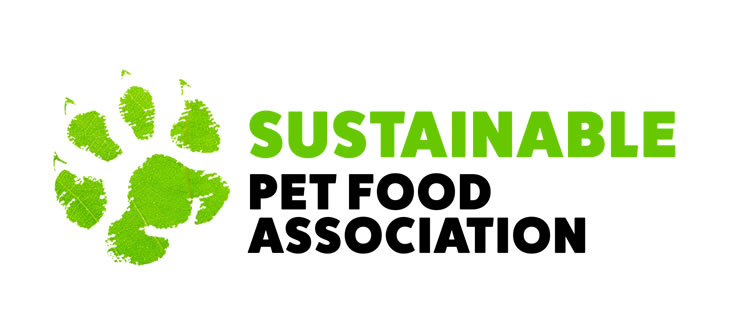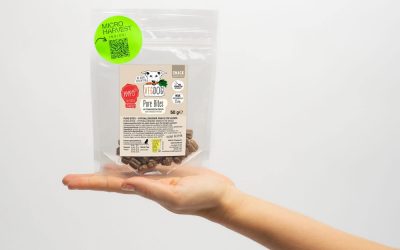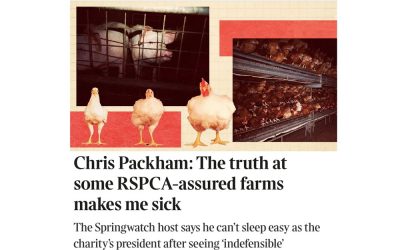This article appeared in the New York Times on the 17th July –
Britain Approves Lab-Grown Meat for Pet Food
For a dog food product to make headline news in the New York Times is very significant and these developments could change the course of how we feed our dogs forever!
Why is cultured meat dog food so significant?
Pet ownership is increasing, but so is the carbon footprint attached to feeding our pets. While experts disagree over the true emissions stemming from pet food, one study from October 2023 suggests that 20% of all meat produced is used for pet food.
What is undisputed is that meat is the most carbon-intensive food group on earth, making up 60% of the food system’s emissions (twice more than what’s generated by plant-based foods).
In the UK, pets eat more per year than the entire population under 18, and Labradors – currently the most popular pet dogs in the country – consume 70 million kg of meat annually, nearly 60% more than their owners.
What of the health benefits to dogs eating cultivated chicken?
The company Meatly who has been given the go-ahead to produce the cultivated chicken dog food in the UK have had their approval assessed by the Food Standards Agency (FSA), the Department for Environment, Food and Rural Affairs (Defra) and the APHA (Animal and Plant Health Agency). These government agencies ensured that it complied with all necessary regulations to pass the rigorous inspection process.
Meatly have prepared a comprehensive safety dossier and conducted extensive testing to demonstrate that cultivated chicken is safe and healthy for pets, and contains no GMOs, antibiotics, harmful pathogens, heavy metals and other impurities.
This is a reminder of these potentially harmful additions that are present in normal meat-based dog food and the fact that there is no concern now with lab-grown meat makes it far more valuable for the health of our dogs in the UK. There is also zero risk on the health of our planet with increased pandemic risks of bird flu Influenza spreading from intensice chicken farms to humans.
Owen Ensor © Meatly
“We don’t need to raise or kill any animals,” Owen Ensor said, laying out the vision for Meatly, which got its cells from a single chicken egg. “Instead of 50 billion chickens a year, it’s one egg, one time, and we’ve created an infinite amount of meat.”
A 2022 study suggested that even if only a third of Brits would try cultivated meat themselves, nearly half (47%) would feed it to their pets.
The main concern that came out of the latter research was nutrition. “We’ve done a lot of nutritional analysis, safety analysis on the product,” Ensor said. “It shows us a very similar nutritional profile to chicken breast and has all of the essential amino acids, fatty acids, minerals and vitamins that cats and dogs need to thrive.”
Asked how much of the cultivated meat would make it into the finished products, he said: “The final product will be decided by pet food manufacturers who will sell to. Most pet food on the market are combinations of meat and other plant-based ingredients, to create nutritionally balanced, complete pet food. Products made with Meatly Chicken will be similar.”
Even at lower inclusion rates, the chicken has a great palatability impact, according to the co-founder. “I’ve fed it to my cats several times and they love it! We’re now conducting comprehensive feeding trials on dogs as well and will be sharing the results once complete,” he siad.
One thing is certain: whenever Meatly’s products do come to market, they’ll roll out at Pets At Home, the UK’s leading pet retailer. It invested in the alternative protein startup’s last fundraising round, and represents the “pinnacle” for pet food companies, according to Ensor.
This could change the way we feed our pets (and ourselves) forever!
Article and information courtesy of Green Queen July 24
Studies claim positivity with alternative pet diets
Many owners willing to consider alternative pet diets, studies claim with a high proportion of cat and dog owners now prepared to explore alternative, more sustainable diet options
Plant-based vs Insect-based dog food
Insect Protein-Based Diets as Potential Risk of Allergy in Dogs, and Higher Cost
Avian Flu Pandemic Risk from Raw Feeding
The APHA (Animal Plant and Health Agency.gov.uk) sends anyone interested in environmental matters, emails about looming threats. As a vet, this is what I have received recently in my email inbox - In my inbox yesterday 11th November - An Avian Influenza Prevention...
Raw dog and cat food fuelling spread of antibiotic-resistant bacteria
The very real and always present danger of this latest study yet again finding antibiotic-resistant bacteria in raw commercial cat foods!
UK Petfoods MUST Keep Up!
Using animal byproducts in meat and fish-based pet foods is NOT sustainable!
Cats dying after eating Avian-Influenza-contaminated raw pet food!
Does vegan cat food provide the solution?
Fermented Protein Pet Food – the Future?
Is precision fermentation our future way to feed not only our pets, but ourselves too? Yes it most certainly is!
Could our dogs or cats trigger an avian influenza pandemic?
As our memories of the last COVID 19 disappear, the potential for another pandemic looms and pets could play a role in transmitting it
Using microbial protein for the very first time in dog treats!
This first-of-its-kind protein is derived from bacteria that have been consumed by humans for centuries in foods such as kimchi, kefir, and sauerkraut
BVA says it is possible to feed dogs plant-based
The British Veterinary Association (BVA) has ended its opposition to (nutritionally-sound) vegan diets for dogs
The truth about ‘RSPCA Assured’ farms
The footage obtained from these farms, including distressing images of decomposing pigs, dying chicks, and salmon with missing eyes, is simply indefensible
The Great Protein Debate – Beef or Beans?
Dr Sue Paterson, RCVS President and Senior Vice President of the European Society of Veterinary Dermatologists interviews Dr Arielle Griffiths about Sustainable Pet Foods















